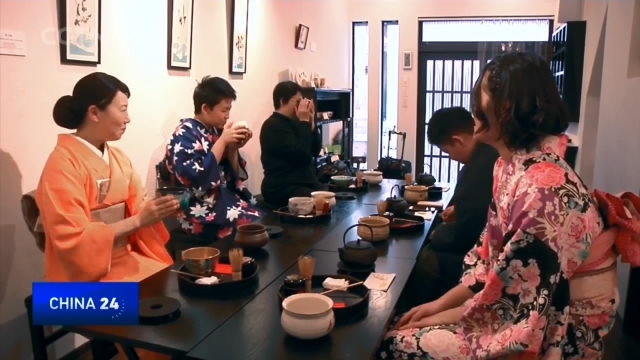
20:47, 18-Feb-2018
Chinese Seek the Japan Experience: A fresh approach for the New Year

The Chinese led all other nations in travel spending in Japan last year, according to Japan's tourism authority. But now Chinese visitors are moving away from what the Japanese have termed "explosive buying sprees" toward calmer, cultural experiences. CGTN's Steve Ross tells us more, from Tokyo.
KEI NAKAJIMA AUTHOR "They are interested in traditional things or events happening on a particular day and place. They are interested in Japanese culture in the way that Europeans are."
Author Kei Nakajima says that Chinese tourists are becoming more sophisticated, and are visiting Japan in larger numbers than ever before, and that trend will continue right through the Chinese New Year holidays.
Her just-published book is titled, "Why Wealthy Chinese Love Japan's Traditional Established Businesses - 54 Tips on China Inbound Tourism."
And, while not all Chinese visitors to Japan are wealthy, as a group their average travel spending topped all other nations, according to the governmental Japan Tourism Agency. But now the object of their spending may be changing.
KEI NAKAJIMA AUTHOR "Chinese people have come to want to do things and have experiences, not only shopping."
They want to do or make something special that's available only in Japan, for example, Japanese tea ceremony or flower arrangement.
STEVE ROSS TOKYO "Chinese tourists and other visitors to Japan's bustling hot-spots frequently find that they need to take a break, and now some are turning to calmer alternatives."
Those calmer alternatives are what travel experts call "experiential tourism," and it's a growing trend. Just a few minutes' walk from Tokyo's tourist magnet, Asakusa temple town, is the Shizu-Kokoro Chado School where Chinese and other international tourists learn about "the way of tea" from first degree tea ceremony instructor Mika Soka Haneishi.
MIKA SOKA HANEISHI SHIZU-KOKORO CHADO SCHOOL "People will think tea ceremony is about drinking macha tea. Yes, it is. But that's actually (the) objective. And (the) subject would be to connect with nature, and connect with people. I tell them, tea ceremony in Japan was more about spirit, like a spiritual discipline. And they're really, really surprised but also, they really enjoyed it."
On this day, the visiting Wang family took a class in the "chado" tea ritual.
MIKA SOKA HANEISHI SHIZU-KOKORO CHADO SCHOOL "In this really simple room, we only talk about very fundamental, very simple things, but very important things: to feel the time, being. Mindfulness is not something that you receive, this is something you're seeking out from yourself."
And, what was the students' impression?
"Calm, and I can think slowly. In my life, I think very much things, and now I just think about my tea."
Steve Ross, CGTN, Tokyo.

SITEMAP
Copyright © 2018 CGTN. Beijing ICP prepared NO.16065310-3
Copyright © 2018 CGTN. Beijing ICP prepared NO.16065310-3